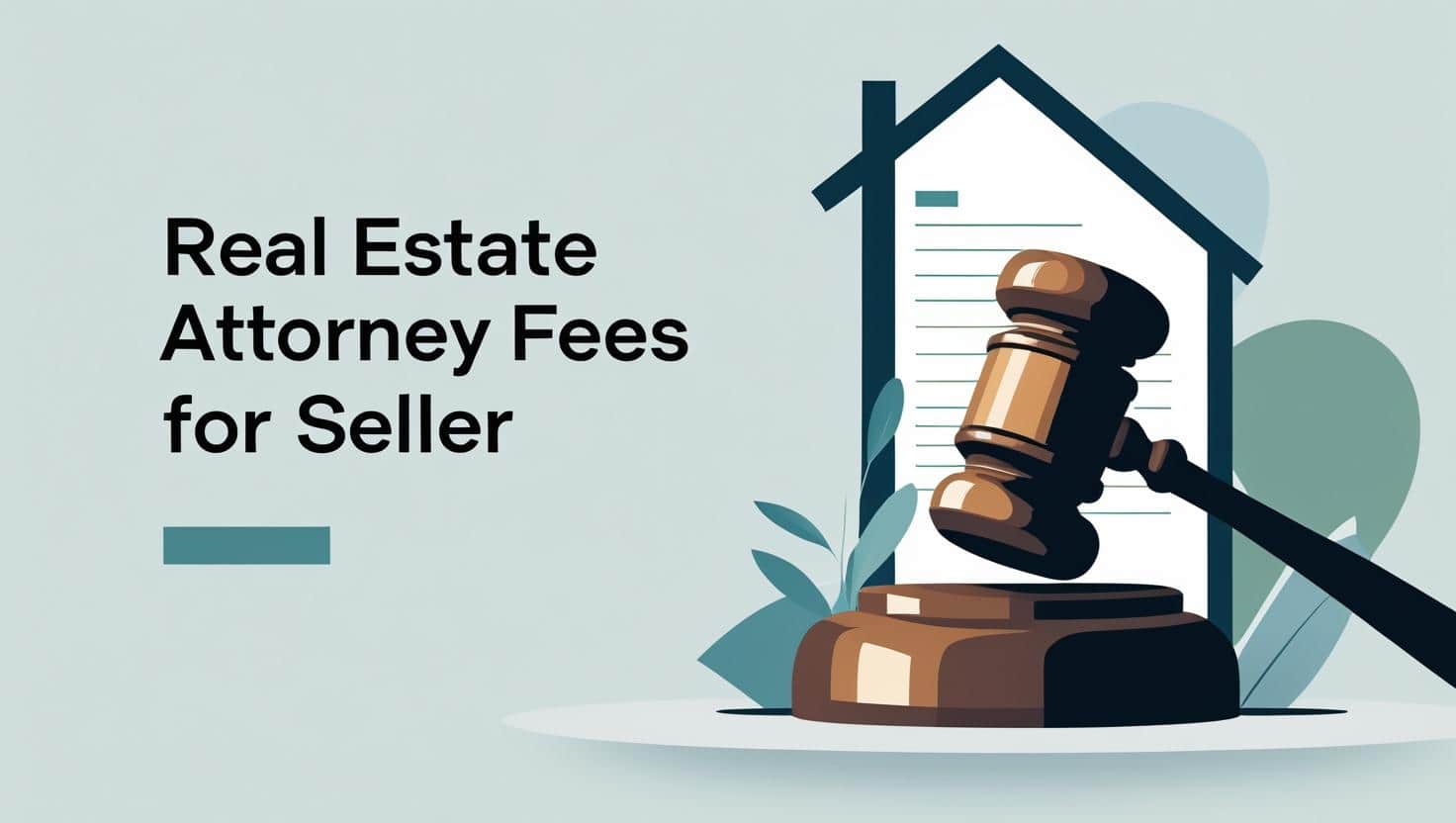You are ready to sell your house. You have sketched out your proceeds, but one line item still often prompts questions: real estate attorney fees for seller. What exactly are you paying for—and when?
This guide breaks down when you need counsel, how fees are structured, and how they fit alongside commissions, escrow, transfer taxes, and required disclosures—in plain English.
Selling can be complex, but a clear checklist and the right attorney keep it manageable. We will keep it clear and concise.
In short: check local rules early, get scope and fees in writing, and build a line‑item budget with your title/escrow team.
Understanding Real Estate Attorney Fees for Seller
If you are planning to sell, you have probably wondered what a lawyer will cost. It is a fair question.
Real estate attorney fees can range from as low as $150 to upwards of $500 per hour, depending on the complexity of the transaction. Some attorneys might also offer flat fees for specific services which typically fall between $800 and $1500.
Costs swing because no two sales are alike. Title wrinkles, deadlines, or tricky repairs can expand scope quickly. These ranges are illustrative; verify locally with written quotes.
To understand price differences, focus on scope, complexity, and market norms; we cover these drivers in “Factors Influencing Real Estate Attorney Fees for Seller” below.
Get the scope and fee structure in writing before any work starts.
Saving Money On Legal Costs
To manage costs, get written quotes from at least two attorneys and compare scope, experience, and availability. Clarify what is included in a flat fee and what triggers hourly time. Coordinate with your listing agent so tasks are not duplicated.
Attorney Fee Structures: What Is Included
| Structure | Typical Use | What is Usually Included |
| Flat fee | Standard residential sale | Contract review or drafting, disclosures review, payoff coordination, routine closing correspondence |
| Hourly | Complex or uncertain scope | Negotiations, curing title defects, HOA/lien resolution, probate/trust coordination |
| Add‑ons | As needed | Power of attorney prep, rush fees, remote/after‑hours signing, out‑of‑state coordination |
Pick the structure that fits your scope and put it in your engagement letter.
Fees Are Just Part of the Equation
Attorney fees are one line item among commissions, escrow charges, transfer taxes, recording fees, and required reports. Costs vary by state and deal structure. Build a simple worksheet of expected line items before you list and share it with your title/escrow team.
The Role and Importance of Real Estate Attorneys in Property Transactions
Real estate attorneys guide sellers through the legal steps of a property sale. They ensure required documents are prepared, reviewed, and executed correctly.
What Do Real Estate Attorneys Do?
A seller’s attorney drafts or reviews the purchase agreement and disclosures, resolves title and payoff issues, and coordinates closing. Some states require attorney involvement at closing. South Carolina requires attorney‑supervised closings (State v. Buyers Service Co., 292 S.C. 426, 357 S.E.2d 15 (1987)), and Georgia requires an attorney’s presence for deed preparation and closing (In re UPL Advisory Opinion 2003‑2, 277 Ga. 472, 588 S.E.2d 741 (2003)).
Massachusetts treats many settlement activities as the practice of law (Real Estate Bar Ass’n v. Nat’l Real Estate Info. Servs., 459 Mass. 512, 946 N.E.2d 665 (2011)). Sellers in these jurisdictions should budget for attorney participation at settlement; tasks like deed preparation and closing supervision must be performed by a licensed attorney, and non‑lawyer handling can constitute unauthorized practice.
Beyond documents, counsel spot issues early—title defects, payoff errors, and boundary disputes—and address them before they derail the sale. Early legal review cuts delays and surprise costs.

Navigating Legal Paperwork With Your Attorney
If the paperwork feels overwhelming, your attorney handles drafting, reviews title and loan documents, and explains obligations in plain language.
In complex situations—financial distress, divorce, trust or probate sales—counsel coordinates additional documents and court approvals as needed. Confirm extra steps and timelines at engagement.
Courts hold sellers and their agents to disclose known material defects (e.g., Easton v. Strassburger, 152 Cal. App. 3d 90 (1984); Johnson v. Davis, 480 So. 2d 625 (Fla. 1985)). Your attorney helps ensure statutory disclosures and contract addenda accurately capture known conditions, reducing rescission or damages risk.
In short, counsel manages routine steps and resolves complications as they arise.
Typical Costs Involved in Selling Property
Selling property is not just about setting a price and finding potential buyers. There are various expenses involved that sellers often overlook, impacting the total cost of the transaction.
Listing Agent Commission and Escrow Fees
The role of listing agents is significant. Broker compensation is fully negotiable by law. Effective August 17, 2024, many MLSs removed compensation fields and require written buyer‑broker agreements; compensation must be arranged outside the MLS.
Discuss the structure—percentage, flat fee, or hybrid—with your agent in advance. Burnett/Sitzer v. National Association of Realtors (W.D. Mo. 2023) and subsequent changes confirm that compensation is not fixed; parties may allocate payment by agreement.
Commission Rules: 2024–2025 Changes
Effective August 17, 2024, Realtor‑affiliated MLSs removed fields for offers of compensation, and written buyer‑broker agreements are required before touring. Compensation remains negotiable and may be arranged outside the MLS and reflected in the purchase contract so escrow or title can disburse correctly. This shift stems from Burnett/Sitzer v. National Association of Realtors and NAR’s 2024 settlement‑driven practice changes, so memorialize the arrangement in writing.
Besides broker compensation, escrow costs are another expense to plan for. Earnest money is held by a neutral escrow holder until conditions are met. For covered mortgage transactions, TRID requires the Closing Disclosure to itemize all costs (12 C.F.R. § 1026.38(f)–(g)); in California, independent escrow agents are licensed under the Escrow Law (Cal. Fin. Code § 17000 et seq.).
Escrow holders owe a limited fiduciary duty to carry out the parties’ instructions precisely (Summit Financial Holdings, Ltd. v. Continental Lawyers Title Co., 27 Cal. 4th 705 (2002)). Give clear, written instructions to reduce disputes.
Note: Settlement-service referral fees and unearned fee-splits are prohibited under RESPA Section 8 and Regulation X § 1024.14.
Closing concessions—agreeing to pay specific amounts toward the buyer’s closing costs or offering repair credits—can add up, but they may also help some buyers close.
- Title insurance: This covers certain defects in title; availability, forms, and rates are governed by state law and regulation and vary by location and policy type. In California, title insurers and underwritten title companies must file their rates and forms with the Insurance Commissioner (Cal. Ins. Code § 12401.1), while Texas promulgates statewide title insurance rates and forms by rule (Texas Department of Insurance, Basic Manual). Title policies insure against covered risks but are not surveys or guarantees; boundary and survey issues are commonly excluded unless covered by endorsement (Walker Rogge, Inc. v. Chelsea Title & Guar. Co., 116 N.J. 517 (1989)).
- Recording fee: charged by the recorder for instruments that affect title or possession (e.g., deeds, deeds of trust); purchase agreements are generally not recorded as a matter of course (see, e.g., Cal. Gov’t Code § 27280).
- Transfer taxes: These apply whenever there’s a change in ownership; rates differ by state and locality. Example—California counties may impose $0.55 per $500 of consideration (0.11%) under the Documentary Transfer Tax Act (Cal. Rev. & Tax. Code § 11911); many cities layer their own taxes. The City of Los Angeles imposes a city rate of 0.45% (in addition to the county tax) and a Measure ULA surtax for higher‑value transfers. Effective for transactions closing on or after July 1, 2025, the ULA thresholds are $5.3 million (4%) and $10.6 million (5.5%).
Total transaction costs vary by market and deal structure; broker compensation and concessions are negotiable and may be paid by either party by agreement. Budget using local rates and line‑item estimates rather than a fixed percentage.
By State or Locality: Quick Guide
- Attorney closings: Requirements vary by jurisdiction; examples include South Carolina, Georgia, and Massachusetts.
- Transfer taxes: Counties and cities may levy taxes in addition to state taxes; check your recorder or finance department.
- HOA/condo fees: Caps and disclosures are state‑specific; review your association’s governing documents and applicable statutes.
- Notary and recording: Per‑signature caps and recording schedules are set by state and local law.
Check local rules early—they drive both costs and whether an attorney must attend closing.
The Impact of Additional Costs on Sellers
Beyond price, statutory and transaction costs—transfer taxes, recording, NHD, HOA/estoppel, and notary—reduce net proceeds. Estimate these line items with your attorney and title/escrow before listing to avoid surprises at closing. Build a one‑page budget and decide in advance which fees, if any, you will agree to pay as concessions.
Natural Hazard Disclosure Report and Home Warranty Costs
A Natural Hazard Disclosure (NHD) report is an essential part of real estate transactions in many states. In California, sellers must deliver a statutory NHD statement disclosing specified hazard zones, and they may rely on a third‑party report if it meets statutory standards (Cal. Civ. Code §§ 1103–1103.15, 1103.4).
Although necessary, this disclosure might influence the sale price due to perceived risks by potential buyers. Order the report early and review any flagged zones with your attorney so disclosures align with facts.
Home warranty costs are another aspect sellers often overlook but need to factor into their total cost calculation for selling properties. These warranties give peace of mind to new homeowners by covering major system repairs for a set period after closing, typically one year.
Sellers sometimes offer home warranties as an incentive to attract more prospective buyers; however, they come with additional out-of-pocket expenses that should be considered when calculating overall profit margins from the transaction. Ask for a quote and sample coverage before offering one as a concession.
| Type of Cost | Typical range (verify locally) |
| Natural Hazard Disclosure Report Fee | $75-$125* |
| HOA Transfer Fees* | $400-$600*+ |
Note: Values are estimates. HOA transfer/estoppel fees apply only if the property is in an HOA. Examples: Arizona caps resale disclosure fees at $400 plus limited add‑ons (A.R.S. § 33‑1806(C)); Florida caps condominium estoppel fees (generally up to $299, with allowable surcharges) (Fla. Stat. § 718.116(8)).
Notary fees are usually modest but can add up across documents. Many states cap per‑signature charges; for example, California allows up to $15 per signature (Cal. Gov’t Code § 8211). Include them in your estimate so small charges don’t chip away at proceeds.

Factors Influencing Real Estate Attorney Fees for Seller
The cost of employing a real estate lawyer can differ drastically depending on multiple elements. This variation is primarily due to the complexity of the transaction and the experience level of your chosen legal professional. Use a written engagement letter that lists tasks included in the base fee and what triggers hourly billing.
A key element that affects attorney fees is whether they charge by an hourly rate or flat fee. Some attorneys might ask for $150 to $500 per hour, while others may offer services for a flat fee ranging from $800 to $1500. It is important not only to understand these costs but also what services are included within this pricing structure.
The Complexity Factor in Attorney Review
Say a payoff letter includes a surprise prepayment penalty or an old deed of trust pops up. Your lawyer works with the lender and title to clear it so you do not sign without full information.
Confirm who handles lien releases, transfer‑tax filings, and HOA/estoppel documents to avoid last‑minute fees and delays.
Influence of Location & Experience
Your location can have a substantial impact on how much you pay for legal assistance during a real estate transaction. In areas where demand for skilled attorneys is high, expect steeper rates than less competitive markets. Seasoned lawyers often charge more; ask for a written quote tied to your property address and a sample engagement letter.
Understanding these factors will help you budget appropriately when selling property. It is crucial not just to look at the flat rate, but also understand what additional costs could come up during your real estate transaction process. Confirm scope and hourly triggers in your engagement letter.
How to Choose a Real Estate Attorney as a Seller
It is essential to hire a knowledgeable real estate attorney, especially if the sale involves hardship, divorce, a trust, or tenants. Here is how to select counsel that fits your transaction.
Start with referrals from recent sellers and your listing agent, then interview two or three candidates. Ask about similar transactions, turnaround times, and who will do the day‑to‑day work. Choose someone who explains next steps in plain language.
You will want someone who can navigate complex issues that might arise during the process like dealing with tenants or managing sales on behalf of deceased owners. But do not just hire based on credentials alone; consider their fees too.
Fees vary by market and complexity. Some attorneys charge hourly while others offer flat fees for defined scopes; request a written estimate that lists what is included and what is not.
Making Your Decision
Get a written scope and timeline from each attorney and confirm who drafts the deed and who handles payoffs and HOA/estoppel documents. Who drafts the deed, clears payoffs, and will be responsive at signing—and how will you be billed for that work? Choose counsel who commits to response times and coordinates directly with escrow/title.
Put scope, timelines, and responsibilities into the engagement letter.
Seller’s Pre‑Listing Checklist (Quick Reference)
- Get two written quotes from real estate attorneys and confirm scope and add‑ons.
- Identify state/local transfer taxes and recording fees with your title/escrow contact.
- Request HOA payoff/estoppel requirements early if applicable.
- Gather disclosures and reports (e.g., NHD in California) and verify accuracy.
- Confirm commission structure and who pays what in writing with your agent.
- Create a one‑page budget with line items and cushions for unexpected costs.
Conclusion
Selling a home is not just about price. It is about understanding real estate attorney fees for seller, broker compensation, escrow fees, and statutory charges.
Attorney rates vary by market, scope, and complexity. Build a line‑item budget, hire the right counsel, and close with confidence. Confirm any attorney‑closing requirements, get scope and fees in writing, and budget line items with your title/escrow team, so there are no surprises at the table.
FAQs
Do I need a real estate attorney to sell my home?
In some states attorneys must supervise closings; elsewhere it is optional but reduces risk. Check local rules and hire early.
How much are real estate attorney fees for seller?
Many markets quote $150–$500 per hour or $800–$1,500 flat for standard sales; verify locally with written quotes. Confirm what is included and what triggers hourly time.
Who pays the attorney’s fee?
It is negotiable and set by agreement; specify it in your listing or purchase contract. Make sure it appears on the Closing Disclosure for proper disbursement.
When should I hire the attorney?
Before you list or, at the latest, before you accept an offer. Early engagement avoids rush fees and catches issues sooner.
Can my agent handle the legal documents instead?
Agents cannot provide legal advice; in some states certain closing tasks constitute the practice of law. Use an attorney to draft, review, and tailor terms.
What documents get recorded?
Deeds and security instruments (deeds of trust or mortgages) are recorded; purchase agreements typically are not. Your recorder sets the fees and format.
How did the 2024–2025 MLS changes affect commissions?
MLSs removed offer‑of‑compensation fields and written buyer‑broker agreements are now standard before touring. Compensation is still negotiable—put the arrangement in the contract.
How do I avoid wire fraud?
Call the escrow/title company using a verified phone number to confirm wiring instructions; do not rely on emailed changes. When in doubt, re‑verify before sending funds.
Are home warranties worth offering?
They can help a buyer feel comfortable but add cost; treat them like a targeted concession. Get a quote and sample coverage before you offer one.
What if a title issue pops up near closing?
Your attorney works with the lender and title to clear liens or encumbrances and adjust timing if needed. Early review and written instructions keep the transaction on track.
Do I need to attend closing in person?
It depends on your state and the documents; many closings can be handled by mail or remote notarization. Ask your attorney and escrow/title about local options.


















































